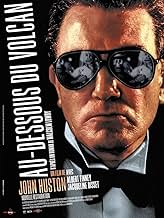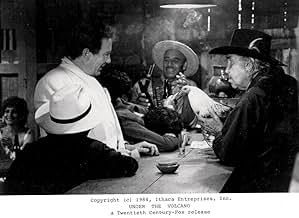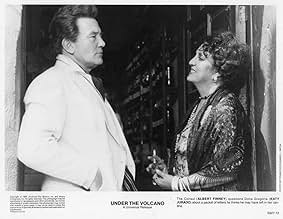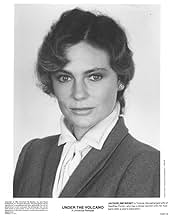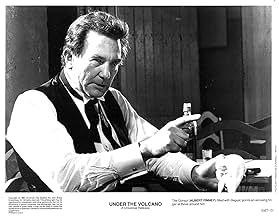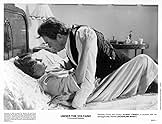IMDb रेटिंग
6.8/10
6.6 हज़ार
आपकी रेटिंग
द्वितीय विश्व युद्ध की पूर्व संध्या पर मेक्सिको में एक आत्म-विनाशकारी ब्रिटिश कौंसल के जीवन में एक दिन।द्वितीय विश्व युद्ध की पूर्व संध्या पर मेक्सिको में एक आत्म-विनाशकारी ब्रिटिश कौंसल के जीवन में एक दिन।द्वितीय विश्व युद्ध की पूर्व संध्या पर मेक्सिको में एक आत्म-विनाशकारी ब्रिटिश कौंसल के जीवन में एक दिन।
- 2 ऑस्कर के लिए नामांकित
- 3 जीत और कुल 7 नामांकन
Ignacio López Tarso
- Dr. Vigil
- (as Ignacio Lopez Tarzo)
José René Ruiz
- Dwarf
- (as Rene Ruiz 'Tun-Tun')
Eleazar Garcia Jr.
- Chief of Gardens
- (as Eliazar García Jr.)
Salvador Sánchez
- Chief of Stockyards
- (as Salvador Sanchez)
Sergio Calderón
- Chief of Municipality
- (as Sergio Calderon)
Emilio Fernández
- Diosdado
- (as Emilio Fernandez)
Roberto Sosa
- Few Fleas
- (as Roberto Martinez Sosa)
फ़ीचर्ड समीक्षाएं
Under the Volcano could have made as just another 'Lost Weekend' film if not for the attention to a simple narrative (though one that has a lot underneath the surface), and a performance to compellingly take us through the unbalanced emotional state of its protagonist. From what I've read about what the novel became by this adaptation, Huston took out the big poetic bits that made it such an unclassifiable (and as many claimed unadaptable) work and made it into a tale of a man's downfall from grace and good times. The story is as such: Geoffrey Firmin (Finney) is a recently retired consul in Mexico who has that big, admirable personality that comes with those who have lived- or boasted to live- quite a life, and have taken now to mass consumptions of alcohol. It's not even about the enjoyment of it, but a compulsion for 'balance' to drink just to get sober, as it might be. He's also divorced, recently, but his wife (Bisset) comes to him again, wanting once more to patch things up.
This is set in the backdrop of the 'Day of the Dead' festival, and on the brink of world war 2, but these things are, however brilliantly and as a kind of delicate lining around, a backdrop for the emotional and mental and, it should be noted, spiritual struggle of Firmin. Huston never preaches about this man's rotting addiction, and there's no easy sympathy either. We see his emotional state rock from happy and hopeful to the pits of despair following the bullfight his half-brother Hugh (Andrews) takes part in, where he can't basically grasp his own reality anymore. Underneath this surface of the film though, where we're given this proud, unstable character, there's chaos riling about, attached in a way to the mood around, with rumored Nazi collaborators in the midst of things, a near-murdered body on the side of the road, the matter-of-fact metaphors of the symbols of death that (as Huston makes in one of the most Gothic openings to a movie I've ever seen) opens the film with marionette skeletons to an eerie Alex North score.
But lest to say that all credit should go to Huston for his storytelling. It's an interesting film for the first three quarters, though in a way feels like it has to be building for something; here and there, even as we're with these character wandering in a state of mind of disarray (will Firmin and Yvonne stay together, split apart, who will run away are the basic questions, as well as how Andrews might have something to do with it on either side), it starts to feel like it could become meandering. In that last quarter, however, Huston lays on a feeling of dread, maybe not entirely with coincidence, that hasn't been seen since Treasure of the Sierra Madre- something bad just HAS to happen, and it will come out through the worst devils of the protagonist's nature. There is that for Huston, the power of that brothel sequence, the terror and even the dark humor.
The best reason above all else, even as it's one of Huston's most challenging films, is that Finney is so terrific in the role. It's a startling work of an actor taking down his guard, making himself vulnerable and naked, so to speak, to the discord booze has brought to his mind. He gets depth to a guy that should be just another Hemingway figure, of the sorrow that really lies in every little moment and gesture and inflection. It also goes without saying he's one of the top three or four convincing drinkers in modern film. And at the same time it's not easy to peg what he'll do next as an actor, which step he might cross or double-back on. While his co-stars are very good in their parts, he dares to overshadow them with a tour-de-force. Under the Volcano pits its character into hell, and Huston brings us, without going overboard with stylistic flourishes, right along with him.
This is set in the backdrop of the 'Day of the Dead' festival, and on the brink of world war 2, but these things are, however brilliantly and as a kind of delicate lining around, a backdrop for the emotional and mental and, it should be noted, spiritual struggle of Firmin. Huston never preaches about this man's rotting addiction, and there's no easy sympathy either. We see his emotional state rock from happy and hopeful to the pits of despair following the bullfight his half-brother Hugh (Andrews) takes part in, where he can't basically grasp his own reality anymore. Underneath this surface of the film though, where we're given this proud, unstable character, there's chaos riling about, attached in a way to the mood around, with rumored Nazi collaborators in the midst of things, a near-murdered body on the side of the road, the matter-of-fact metaphors of the symbols of death that (as Huston makes in one of the most Gothic openings to a movie I've ever seen) opens the film with marionette skeletons to an eerie Alex North score.
But lest to say that all credit should go to Huston for his storytelling. It's an interesting film for the first three quarters, though in a way feels like it has to be building for something; here and there, even as we're with these character wandering in a state of mind of disarray (will Firmin and Yvonne stay together, split apart, who will run away are the basic questions, as well as how Andrews might have something to do with it on either side), it starts to feel like it could become meandering. In that last quarter, however, Huston lays on a feeling of dread, maybe not entirely with coincidence, that hasn't been seen since Treasure of the Sierra Madre- something bad just HAS to happen, and it will come out through the worst devils of the protagonist's nature. There is that for Huston, the power of that brothel sequence, the terror and even the dark humor.
The best reason above all else, even as it's one of Huston's most challenging films, is that Finney is so terrific in the role. It's a startling work of an actor taking down his guard, making himself vulnerable and naked, so to speak, to the discord booze has brought to his mind. He gets depth to a guy that should be just another Hemingway figure, of the sorrow that really lies in every little moment and gesture and inflection. It also goes without saying he's one of the top three or four convincing drinkers in modern film. And at the same time it's not easy to peg what he'll do next as an actor, which step he might cross or double-back on. While his co-stars are very good in their parts, he dares to overshadow them with a tour-de-force. Under the Volcano pits its character into hell, and Huston brings us, without going overboard with stylistic flourishes, right along with him.
This is one of those films that I wanted to see because of the rave reviews I had read about a particular performance, rather than for the quality of the film which was generally described as mediocre at best.
Sometimes its just as interesting to see one aspect of a film (particularly a single performance) standing head and shoulders above anything else.
I was led to believe 'Under the Volcano' was such a film especially after the Halliwell Film Guide (easily the best movie guide) described it as a 'drunken monologue' which was 'fascinating as a tour de force'.
So I expected this to be an average film that focussed almost entirely on and was finally saved by a remarkable performance (by Albert Finney) in the lead role.
The fact that it wasn't had nothing really to do with Finney's performance, the character he plays simply does not allow him to give the sort of performance that I had read about.
His portrayal of a permanently tipsy retired British consul (Geoffrey Firmin) drinking himself to death was fine. However the structure of the film was totally different from how it had been described, there was not a single monologue in the film and it was never the sort of apocalyptic journey into a man's tortured mind that I had hoped would fully test an actor of Finney's calibre.
Instead we see Firmin joined by his half brother and wife (played by Anthony Andrews and Jacqueline Bisset respectively) as they go for a walk and have a journey on a bus.
That is basically the entire film, Firmin's character is surprisingly serene compared with what I was expecting (no rage or acting fireworks at all) whilst Andrews and Bisset play the sort of dotty, stereotypically English twits that wouldn't look out of place in 'Four Weddings and a Funeral'.
The fact that the two characters are former lovers is supposed to add tension to the proceedings but it really doesn't.
Although the role never allows Finney to be brilliant, his skill and assurance is in stark contrast to his two co-stars who look awkward in comparison and their limitations are all too obvious alongside a far more talented performer.
So this dull and rather pointless film plods along towards its supposedly tragic but unintentionally risible conclusion which rather than providing shocking drama delivers slapstick comedy akin to Laurel and Hardy.
Why John Huston chose to make this is a mystery, this type of film is destined to fail.
Sometimes its just as interesting to see one aspect of a film (particularly a single performance) standing head and shoulders above anything else.
I was led to believe 'Under the Volcano' was such a film especially after the Halliwell Film Guide (easily the best movie guide) described it as a 'drunken monologue' which was 'fascinating as a tour de force'.
So I expected this to be an average film that focussed almost entirely on and was finally saved by a remarkable performance (by Albert Finney) in the lead role.
The fact that it wasn't had nothing really to do with Finney's performance, the character he plays simply does not allow him to give the sort of performance that I had read about.
His portrayal of a permanently tipsy retired British consul (Geoffrey Firmin) drinking himself to death was fine. However the structure of the film was totally different from how it had been described, there was not a single monologue in the film and it was never the sort of apocalyptic journey into a man's tortured mind that I had hoped would fully test an actor of Finney's calibre.
Instead we see Firmin joined by his half brother and wife (played by Anthony Andrews and Jacqueline Bisset respectively) as they go for a walk and have a journey on a bus.
That is basically the entire film, Firmin's character is surprisingly serene compared with what I was expecting (no rage or acting fireworks at all) whilst Andrews and Bisset play the sort of dotty, stereotypically English twits that wouldn't look out of place in 'Four Weddings and a Funeral'.
The fact that the two characters are former lovers is supposed to add tension to the proceedings but it really doesn't.
Although the role never allows Finney to be brilliant, his skill and assurance is in stark contrast to his two co-stars who look awkward in comparison and their limitations are all too obvious alongside a far more talented performer.
So this dull and rather pointless film plods along towards its supposedly tragic but unintentionally risible conclusion which rather than providing shocking drama delivers slapstick comedy akin to Laurel and Hardy.
Why John Huston chose to make this is a mystery, this type of film is destined to fail.
Albert Finney's performance of alcoholism is shattering and spot on. This movie should be required as adjunctive therapy in the field of alcoholism recovery. The feeling of hopelessness that permeates this movie makes it an experience the viewer should be advised about.
This movie packs a punch and Finney's performance is as exact and nuanced as is possible. His posture, his mental states, emotions, facial expressions, use of language, clothing, physicality are completely consistent with those of an alcoholic in an advanced stage of the disease.
Although it's a one-man movie, the other main players act exactly as real people do when dealing with alcoholics and portray the emotions and feelings that surround alcoholic situations.
This movie is definitely not a walk in the park.
This movie packs a punch and Finney's performance is as exact and nuanced as is possible. His posture, his mental states, emotions, facial expressions, use of language, clothing, physicality are completely consistent with those of an alcoholic in an advanced stage of the disease.
Although it's a one-man movie, the other main players act exactly as real people do when dealing with alcoholics and portray the emotions and feelings that surround alcoholic situations.
This movie is definitely not a walk in the park.
This is a fairly forgotten gem from the mid-80s, based on the classic and tragic novel of the same name. The film is also the legendary John Huston's third last movie as a director. Taking place in Mexico during the festival known as the Day of the Dead, the film also works against a backdrop of the early days of WWII, and explores the fragmented love triangle between a former British diplomat (Albert Finney), his estranged wife (Jacqueline Bisset), and his adventurous journalist brother (Anthony Andrews).
Under the Volcano starts out slowly, following the corpse-like wandering of retired diplomat Geoffrey Firmin as he explores the Day of the Dead and seeks out booze to feed his alcoholism. We're given various clues as to what has left him in such a sodden and rambling state, and we learn that his wife divorced him from abroad. Geoffrey proceeds to drink himself into oblivion, and into the fray enters his erstwhile wife Yvonne... testing the waters as it were for a possible reconciliation. Geoffrey's brother Hugh, recently returned from the Spanish civil war, is at a loss as to where he fits in with regards to their relationship, and also in regards to the world itself. The three decide to take a day trip out of town, with Yvonne and Hugh unsure of where Geoffrey's health and state of mind will literally lead them.
This film is a rambling, elegaic swansong to suntouched dreams fortified by alcohol. These three people try to outrun their demons and replace their mistakes with hollow new plans - Yvonne hopes to start her life anew, but Geoffrey's disgracefully drunken state makes him an unpredictable quantity to bank on, especially in regards to whether he can forgive her for the adultery that left him in such a state. Geoffrey tells a story at one point about a colonial named Blackstone, a man who turned native and disliked the puritans who tried to save him so much that he simply just disappeared into the wilderness. There's obviously something about this story that appeals to Geoffrey as he seems to identify with Blackstone so much that he later tells strangers that it's his name, and you can't help but feel that this is the only solution to the problems at hand that he can truly grasp at. Bubbling underneath the surface of the film all this time is a slowly building sense of doom highlighted by the coming of WWII, the ominous woodwind score, and the film's title itself. Geoffrey alludes to a horrific war story at several points, drawing comparisons with the 30s horror film Mad Love (referred to here as The Hands of Orlac) with his belief that "Some things you can't apologise for", and this quote echoes throughout the film whenever the main characters are forced to come face to face with each other's mistakes.
This won't be a film to everyone's taste, it starts out as something approaching a travel-drama but kind of mutates into outright tragedy in it's second half. At the core of Under the Volcano is a staggering performance from Albert Finney as the drunken diplomat. Finney was more than rightfully nominated for a Best Actor Academy Award for his realistic depiction of the life of a hopeless drunk... full of whimsy and cheer and rambling anecdotes, treading a fine line between absolute tankdom and lucidness, and tapping into all kinds of ambivalent emotions that would be far too challenging to a less complex and accomplished actor. Too often the drunk in film is shown as either a figure for comedy, fear or tragedy, but never are they shown as realistically as Finney's characterisation here. I could see shades of every pathetic and hilarious drunk I've ever met at a pub or a party in Under the Volcano's Geoffrey Firmin, and the film makes no compromises whatsoever in showing this for what it is. One of the best performances in film.
HIGHLIGHTS: There's nothing quite like a sinister Mexican dwarf grinning while he makes obscene gestures with his hands. I found this bit to be quite offputting and creepy.
Under the Volcano starts out slowly, following the corpse-like wandering of retired diplomat Geoffrey Firmin as he explores the Day of the Dead and seeks out booze to feed his alcoholism. We're given various clues as to what has left him in such a sodden and rambling state, and we learn that his wife divorced him from abroad. Geoffrey proceeds to drink himself into oblivion, and into the fray enters his erstwhile wife Yvonne... testing the waters as it were for a possible reconciliation. Geoffrey's brother Hugh, recently returned from the Spanish civil war, is at a loss as to where he fits in with regards to their relationship, and also in regards to the world itself. The three decide to take a day trip out of town, with Yvonne and Hugh unsure of where Geoffrey's health and state of mind will literally lead them.
This film is a rambling, elegaic swansong to suntouched dreams fortified by alcohol. These three people try to outrun their demons and replace their mistakes with hollow new plans - Yvonne hopes to start her life anew, but Geoffrey's disgracefully drunken state makes him an unpredictable quantity to bank on, especially in regards to whether he can forgive her for the adultery that left him in such a state. Geoffrey tells a story at one point about a colonial named Blackstone, a man who turned native and disliked the puritans who tried to save him so much that he simply just disappeared into the wilderness. There's obviously something about this story that appeals to Geoffrey as he seems to identify with Blackstone so much that he later tells strangers that it's his name, and you can't help but feel that this is the only solution to the problems at hand that he can truly grasp at. Bubbling underneath the surface of the film all this time is a slowly building sense of doom highlighted by the coming of WWII, the ominous woodwind score, and the film's title itself. Geoffrey alludes to a horrific war story at several points, drawing comparisons with the 30s horror film Mad Love (referred to here as The Hands of Orlac) with his belief that "Some things you can't apologise for", and this quote echoes throughout the film whenever the main characters are forced to come face to face with each other's mistakes.
This won't be a film to everyone's taste, it starts out as something approaching a travel-drama but kind of mutates into outright tragedy in it's second half. At the core of Under the Volcano is a staggering performance from Albert Finney as the drunken diplomat. Finney was more than rightfully nominated for a Best Actor Academy Award for his realistic depiction of the life of a hopeless drunk... full of whimsy and cheer and rambling anecdotes, treading a fine line between absolute tankdom and lucidness, and tapping into all kinds of ambivalent emotions that would be far too challenging to a less complex and accomplished actor. Too often the drunk in film is shown as either a figure for comedy, fear or tragedy, but never are they shown as realistically as Finney's characterisation here. I could see shades of every pathetic and hilarious drunk I've ever met at a pub or a party in Under the Volcano's Geoffrey Firmin, and the film makes no compromises whatsoever in showing this for what it is. One of the best performances in film.
HIGHLIGHTS: There's nothing quite like a sinister Mexican dwarf grinning while he makes obscene gestures with his hands. I found this bit to be quite offputting and creepy.
There are pointless arguments to be had as to whether Burton and Taylor in the main roles would have been better and wouldn't it have been good to see that Losey or, praise be, the Bunuel version get off the ground, but we have what we have. Almost fifty years on from when I read the deeply affecting book I cannot recall how faithful the telling is although I do retain a memory of it being more intense and foreboding than here. That volcano was not just a pretty picture but something like the forthcoming war that impinged upon the daily life. Nevertheless this is a very fine effort, Finney gives it his all and just about convinces, Bisset is pretty but less convincing and Huston has an eye for the Mexican setting, particularly the Day of the Dead celebrations and the final ghastly booze and debauchery sequence. But then, Huston himself knew more than a little about, not just drinking, but periods of drinking all the time, or as someone says here, 'drinking himself sober'.
क्या आपको पता है
- ट्रिवियाOn Albert Finney, director John Huston said, "I think it's the finest performance I have ever witnessed, let alone directed".
- गूफ़The story takes place in 1938, but the car driven by James Villiers that almost hits Albert Finney as he is lying in the road is an MG-TF, which was manufactured between 1953 and 1956.
- भाव
Geoffrey Firmin: How, unless you drink as I do, can you hope to understand the beauty of an old indian woman playing dominoes with a chicken?
- कनेक्शनFeatured in At the Movies: Conan the Destroyer/Top Secret!/Under the Volcano (1984)
टॉप पसंद
रेटिंग देने के लिए साइन-इन करें और वैयक्तिकृत सुझावों के लिए वॉचलिस्ट करें
- How long is Under the Volcano?Alexa द्वारा संचालित
विवरण
- रिलीज़ की तारीख़
- कंट्री ऑफ़ ओरिजिन
- आधिकारिक साइटें
- भाषाएं
- इस रूप में भी जाना जाता है
- Unter dem Vulkan
- फ़िल्माने की जगहें
- Acapantzingo, Morelos, मेक्सिको(Iglesia San Miguel Arcangel: opening scene of the Day of the Dead at dusk)
- उत्पादन कंपनियां
- IMDbPro पर और कंपनी क्रेडिट देखें
बॉक्स ऑफ़िस
- US और कनाडा में सकल
- $25,56,800
- US और कनाडा में पहले सप्ताह में कुल कमाई
- $31,000
- 17 जून 1984
- दुनिया भर में सकल
- $25,56,800
- चलने की अवधि1 घंटा 52 मिनट
- ध्वनि मिश्रण
- पक्ष अनुपात
- 1.85 : 1
इस पेज में योगदान दें
किसी बदलाव का सुझाव दें या अनुपलब्ध कॉन्टेंट जोड़ें



